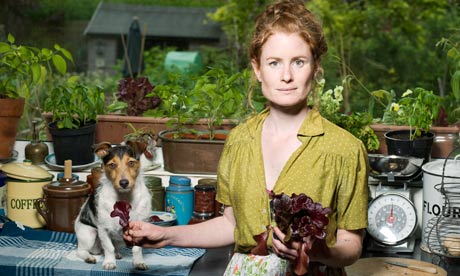
Before she became a presenter on the BBC, and a gardening writer with a Guardian column and three books to her name, Alys Fowler picked up some lessons that would prove highly valuable to her budding career. She trained at the Royal Horticultural Society and Kew Gardens, and at the New York Botanical Garden in the Bronx – but it was her experience of being green-fingered in densely populated urban landscapes that compelled Fowler to make the most of the limited green space available. "I've grown all kinds of things in all kinds of places," she says. "Balconies, windows, stairwells…"
Fowler has since swapped London for Birmingham and a decent-sized garden, but making a lot out of very little is still central to her gardening philosophy. "You should use every space available," she says. "Whether it's a balcony or even just a windowsill with a bit of sun, you'll be amazed how much you can grow."
Buy the right window box
The most important thing to consider when buying a window box (or making your own) is the depth: you need at least 15-20cm to give a good root run. Make sure there are drainage holes at the bottom and put a drip tray underneath.
Boxes come in different materials, each with their pros and cons. Metal looks nice but heats up easily and often burns the roots. Wood is good because it absorbs a lot of water but ends up much heavier as a result. Plastic is probably the least attractive option but the most user-friendly. If you are intent on using a metal box, line the inside with cardboard before you add compost: that will help insulate the roots. The more root space you have, the healthier your plants will be, so get the biggest box you can accommodate.
Make sure you secure it properly: you don't want to kill your neighbour. I once had some pots that fell off a windowsill because I hadn't secured them.
Invest in compost
I always advise people to buy the best potting compost they can afford, even if it means scrimping on the pot. I use a brand called Carbon Gold: it's very light, so it doesn't add weight to your windowsill, and absorbent so you don't have to water so often. Fill the box until compost is 2.5-5cm below the lip.
Choose seed, plant seed
You don't have to buy the most expensive seeds. I always use the Italian seed company Franchi because they are the most generous – one packet for £1.99 should keep you in lettuce year-round for two years. If you want micro leaves, plant the seeds 1cm apart. For baby leaves, plant the seeds 5-10cm apart. If you want big lettuces, each plant has to be 25-35cm apart, minimum. Micro leaves will give you only a single cut but they'll come up really quickly – two to four weeks. Baby leaves can be cut when they're about 10cm high; they'll re-grow, but they get a bit tough on their third flush.
There are hundreds of different lettuce varieties out there: just choose the ones you're most likely to eat. Some varieties are specially bred for patio use: Tan Tan, Little Gem and the smaller cressheads. And there are many other things you could plant: rocket, land cress, Greek cress, pea shoots – to name a few. Peas are easy: get a packet of dried peas from the supermarket. Sow them really packed in, maybe even 5mm between each one. Give them a really good water, and you'll get at least two or three cuts, maybe four. Rocket is unbelievably easy – just keep sowing it often and eating it small.
Watering and orientation
The best way to water is from the bottom up. Sit the box in a large container of water – a bath will do – and when the top surface turns damp you'll know the entire box has been watered. If you'd rather water from the top, make sure you keep going until water comes out of the drainage holes.
One thing to be aware of is that lettuces don't like hot sun, so put them somewhere they can get afternoon shade, or they'll wilt. If you have a south-facing window, I'd grow nasturtiums there instead: you can use the flowers in salads. On windowsills that don't get any sun, you probably won't be able to grow too many salady plants but you can grow herbs such as mint and mitsuba, a Japanese herb.
With balconies, think big!
If you have a balcony at home, you can grow loads more things that can go into a salad. Get really deep pots so you can grow those bigger lettuces. Use every space you can find and grow dwarf French beans, radishes, tomatoes and spring onions. Create supports for a cucumber plant to climb up. Wall-mounted pots are an excellent idea and you can grow herbs in them. Again, the depth of pot is important – the bigger a pot you can give something, the happier it's going to be. Particularly something like a cucumber or dwarf French beans. On a hot day they're relying on you to water them. If you want tasty, you should water often.
It's nice to do a bit of composting as well: worm bins make fantastically good compost, and you get a liquid tea you can feed your plants with. It's a nice part of the cycle, and you don't have to buy a new compost every year – that brings the cost down considerably.
There are some good blogs about people growing salads on balconies – one is called Life on the Balcony. It's nice to follow someone who's doing the same thing as you.

